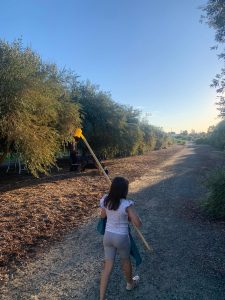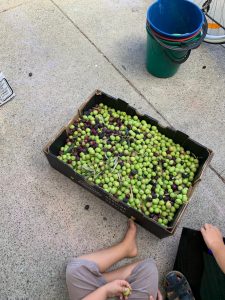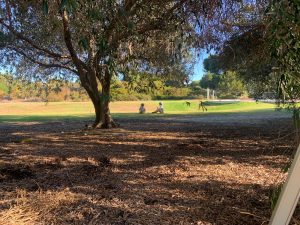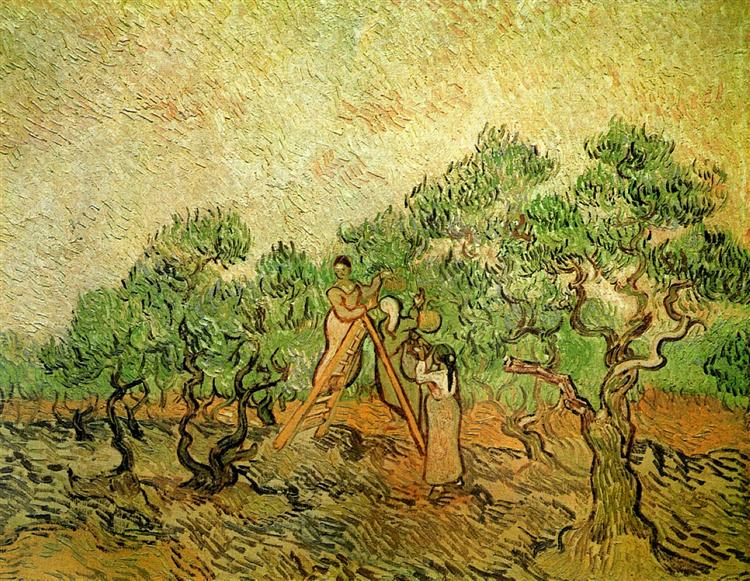The trees were likely planted some 50+ years ago, and we are particularly grateful for that. I’d never expected to be wandering the neighbourhood picking fruit, and in such quantities, but here we were. In fact, this was the second year we’ve done it, and the few days we were feverishly busy at it ended with a thankful prayer for the souls of the likely Italian migrant families who planted those olive trees all over Fremantle and surrounds.
Being the second year in a row participating in this activity, it has now become something of a family tradition, and our goal is to keep it up. Each year we pick a date late in April and book in a press at an olive oil press in a town about an hour and a half’s drive from our place. We spend the weeks preceding the press scoping out local trees laden with fruit, and hoping that we are not beaten to the picking in the days preceding it by the local nonnos—none of whom, I might add, abide by the Mosaic law, and so they leave behind no gleanings at all for the late comers.

We’ve done this with a couple of other families, and the days of picking are sometimes communal, sometimes competitive—but they are always good fun, and the delightful autumnal atmosphere is almost sickeningly wholesome. It is the kind of work that our oldest kids can participate in meaningfully, and our youngest can be around safely.
When I speak of this activity with friends or coworkers, I am often met with one or sometimes both of the following two responses: First, there is the question of cost—both the cost of the press, and of the time spent, as well as the petrol to get us to the press and back. The second response is one of delight, and sometimes jealousy at the fact that we’ve made the time to do this.
I find it interesting that these responses are so common, and so commonly expressed simultaneously by those with whom I am speaking. The delight (and the jealousy) at the prospect of spending a day like this is understandable especially when it comes from those who, like me, spend a good portion of their working week staring at a computer screen in a fluorescently lit office space. There is something so utterly wholesome about spending a few days at an activity like this, that can include everyone, and which culminates in a visit to a small town beyond the seemingly endless suburban sprawl of the greater metropolitan region, but one has to make time in their busy schedule to make this a reality. Talk of it musters up a kind of nostalgia (even for times never personally experienced).

The consideration of the cost/benefit for the days activities is, in my estimation, particularly telling of the way in which our society has fragmented, with the specialisation of tasks being so commonplace that the gathering and preparing of food or foodstuffs (such as olive oil) is so uncommonly foreign for suburban folks, such as myself. Why spend your time doing this, when you could buy perfectly good oil from the shops on your next visit? And think of what else you could be doing with that time? These questions point to something profound in the psyche of the modern suburbanite.
The philosopher D. C. Schindler, writes eloquently about an aspect of how modern liberal cultures (of which, I would argue Australia is one) understand freedom. Schindler dives deep into the philosophical writings of the Scottish enlightenment thinker John Locke, so influential amongst the American founding fathers, to show how modern liberal notions of freedom adopted from Locke, invert the classical understanding by inverting the metaphysical prioritisation of act over potency. While this might seem to be some point of arcane philosophy, it is really little more than a descriptor of a particularly noteworthy and almost self-evident feature of modern life—namely the preference for possibility over what is in fact actual. This is manifest in the modern propensity to try and keep our options open in the face of actually committing to something is something of a cultural trope. The potential of a good time elsewhere might in fact prevent us from enjoying what is in front of us. The initialism ‘FOMO’, for example, (fear of missing out) has become all pervasive in our language, such that the editors of the Oxford English Dictionary thought to include it in their catalogue of words way back in 2013.
The danger of this inclination to prioritise potency over actuality is that it buffers us from the real, the real experience that is right in front of us. Real things lose their shine, and possible things always seem to be more appealing. The curated manner in which friends and celebrities share their current activities on various social media platforms seems only to feed this beast. Without hoping to trivialise the seriousness of the problem that grips our culture today, such a view of life may in fact be a significant contributor to the rise of mental health problems and other social ills (such as the protracted adolescence that seems to effect so many of our young adults into their 20s and even 30s).

The simple activity of picking olives and pressing our own oil for the year ahead brings a great sense of joy and satisfaction, not only to us who will enjoy the oil, but also to our kids who now await this task each year expectantly. More than this, it connects the computer bound, screen-dwelling suburbanites with something real: the movement of the seasons, the physicality of the necessity of food production, the joy of common productive work in the family.
The building of family traditions such as this, particularly within the context of the homogenising late-modern, suburban life, is a particularly joy-filled way of pushing back against the unreality of modern times. But besides the abstractions, there is nothing quite like enjoying one’s own freshly baked bread dipped into one’s own pressed olive oil at a family meal.

